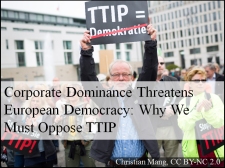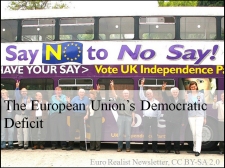Letter by David O’SULLIVAN, EU Ambassador to the US in Washington DC.
Thank you Jeanne for your contribution to this important debate. It is very encouraging to see the interest of young people like you, particularly because the impact of this trade agreement will be felt more by your generation than mine. However, there are some elements in your analysis with which I don’t agree.
The Transatlantic Trade and Investment Partnership will bring significant opportunities across many areas. It is supported unanimously by all 28 Member States, and by two resolutions of the European Parliament.
Yes, some citizens and groups have voiced concerns. Let me address those:
Economic

TTIP will help companies do business on both sides of the Atlantic, increasing consumer choice, lowering prices and creating new export opportunities. The Centre for Economic Policy Research estimates that an ambitious TTIP deal would grow the EU economy by around €120 billion (or 0.5% of GDP) – with 2015’s euro area growth at 0.9%, not a negligible figure.
Over 30 million European jobs – one in every seven – depend on our exports around the world. That’s 12 million more than in 1995 and will only increase as technology drives global economic integration; 90% of global growth in the next 20 years is predicted to come from outside the EU. Yes, the Commission’s 2013 impact assessment report foresees adjustments between sectors, with potential job losses in some being offset by higher job and wage growth in those benefitting most from trade liberalisation. Governments must of course help facilitate those transitions through training and other programs. And the report’s assumption of full employment discounts the overall net positive effect of TTIP on job creation.
ISDS
ISDS has indeed proven one of the more controversial elements of TTIP. ISDS provisions form an important part of more than 400 EU agreements, and 3000 globally, dating back to the 1950s. But they are not perfect, and TTIP will allow us to improve them. We must acknowledge both their weaknesses (cases against tobacco plain packaging legislation being an example of “ISDS gone wrong”) and their benefits (preventing expropriation, for example, with its consequent job losses). We want to create a new, modern system of investment arbitration based on the following principles:
- The removal of any ambiguity over the right of sovereign governments to regulate.
- Addressing potential conflicts of interest through a pre-approved list of arbitrators, with qualifications at the same level as those of judges.
- Establishing an appeal mechanism, plugging a significant hole in previous ISDS regimes.
- Clarifying relationships between ISDS and domestic courts, to remove the risk of parallel claims.
These are not cosmetic changes, but represent the most significant overhaul of investment arbitration in decades and will create a system for investment protection and arbitration fit for the future.
Secrecy
Claims of secrecy could not be further from the truth – these are the most open bilateral free trade negotiations ever seen. Our text proposals are publicly available online. We meet regularly with a broad range of stakeholders in Brussels and across Europe, and we have set up a civil society advisory group with equal representation of public interest groups and companies.
Nor has the European Commission given any company access to confidential TTIP papers. If we stand accused of openness and inclusive consultation, we are guilty as charged. Consulting all stakeholders – not only business but civil society, trade unions and consumer groups – is integral to the mandate Member States have agreed.
And when it comes to democracy, this negotiation was launched with unanimous support of 28 EU Member States and backed by two resolutions of the European Parliament. They maintain a strong and close interest. No trade agreement will enter into force without approval of the European Parliament and the Member States. We are a democratic European Union with a democratic trade policy. It’s that simple.
Standards
TTIP’s most significant economic gains will derive from regulatory cooperation. Both EU and US have similar levels of regulatory protection. However duplicatory regulatory regimes do not increase consumer protection, they are simply an additional burden for companies.
A specific example: pharmaceuticals. The rules on manufacturing practices are the same on both sides of the Atlantic. But we currently don’t recognise each other’s inspection regimes, so companies are inspected twice for compliance with the same rules. This means extra costs that limit trade and are an inefficient use of regulatory resources. I invite you read more online about our aspirations in each of the regulatory clusters.
It is easy rhetoric to say that regulatory cooperation will only benefit multinationals. In fact small companies, who lack the resource to deal with two parallel regulatory systems, will gain most from easier market access. As we begin to regulate new areas of technology the European Commission has proposed the creation of a regulatory cooperation body comprising regulators from both sides and free from industry influence.
Of course we will not trade prosperity against health, safety, the environment or financial stability. So where rules differ greatly we accept we may not agree. That goes for our laws on genetically modified organisms and hormones in beef. But we will make progress where it makes sense, as with the recent approval for lactic acid and beef, under strict veterinary control.
So TTIP can bring significant gains for the next generation. Trade will be even more important in the 21st century than it was in the 20th. That is also why agreements are getting more complex. Europe invented trade and will succeed or fail through our ability to remain competitive in a globalized economy. We have many strengths. We should face this future with confidence and optimism.
RELATED ARTICLES:






An excellent case made; great to see such a lively debate on this site. Thanks to all. I myself trust David O’Sullivan’s arguments & re-assurances. TTIP is the right thing to do – and do well.
LikeLike